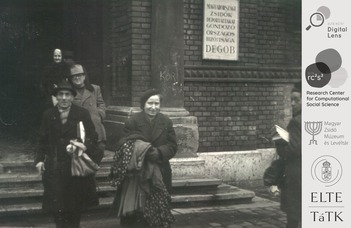Patterns of Survival | DEGOB Protocols in a New Light

18. April 2024. 17:00 - 30. June 2024.
Hungarian Jewish Museum and Archives (H–1077 Budapest, Dohány utca 2.)
2024. April 18. 17:00 - 2024. June 30.
Hungarian Jewish Museum and Archives (H–1077 Budapest, Dohány utca 2.)
Important update >> For security reasons, access to the museum will take some time, so the organisers ask that you allow time to enter before the event starts. Also for security reasons, there is no access to the museum after 6 pm.
The DEGOB protocols are based on interviews with Holocaust survivors conducted by the volunteer clerks of the National Relief Committee for Deportees (DEGOB) in 1945. The committee interviewed approximately five thousand survivors who had just returned from deportation, gathering information about their lives before deportation, the circumstances of their deportation, their experiences, and their plans for the future. The available more than 3,600 protocols have been continuously processed by the staff of the Hungarian Jewish Museum and Archives since the 1990s.
The research group Digital Lens analyzed this open-access collection using innovative digital tools alongside traditional qualitative and quantitative methods. The group's research questions revolve around the language of the Holocaust, the topography of persecution and survival, and the differences between the gendered experiences. They seek answers through automated text analysis, visualizations, and the use of artificial intelligence. In presenting their suggested technical solutions for illustrating the topography of persecution, Digital Lens employed data visualization tools capable of depicting historical experiences that are often impossible to capture based solely on existing paper records. The mapping of the routes taken by the deportees revealed that the Auschwitz-centric perspective does not align with the survivor experience detailed in immediate post-war recollections. The exhibition aims to showcase the research group's work and results.
The research findings are complemented by archival items related to DEGOB and a site-specific artwork by Melinda Sipos, thus commemorating the 80th anniversary of deportations in Hungary. Sipos combines her artistic practice and expertise in materializing data in spatial installations and sculptures for interdisciplinary research projects.
The exhibition brings together science, art, and the digital world, unveiling the past and its memories to visitors through testimonies.
Opening: April 18, 2024, Thursday, 5 p.m., Hungarian Jewish Museum and Archives – 1077 Budapest, Dohány street 2.
Exhibiting Artist: Melinda Sipos
Organizers of the Exhibition: Ildikó Barna, Alexandra M. Szabó, Eszter Katona, Barbara Gellén

